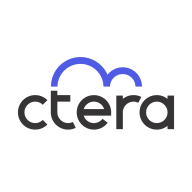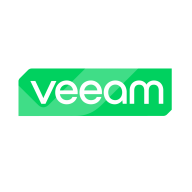

CTERA Enterprise File Services Platform and Veeam Data Cloud for Microsoft 365 compete in the file services and cloud backup solutions category. CTERA Enterprise File Services Platform appears to have the upper hand due to its hybrid deployment flexibility and strong customer support alongside cost-effective pricing, which enhances long-term ROI.
Features: CTERA Enterprise File Services Platform offers robust scalability, seamless hybrid support, and sophisticated data protection functionalities like versioning and replication. It provides data accessibility through various protocols and resilience with instant recovery capabilities. Veeam Data Cloud for Microsoft 365 offers excellent integration and restoration features for cloud environments, with granular recovery options and strong data protection for Microsoft 365 applications. It has an intuitive setup and seamless backup capabilities across Office 365 components.
Room for Improvement: CTERA Enterprise File Services Platform could improve by offering more comprehensive built-in monitoring, reducing update downtime, and enhancing cache management and search functionalities for snapshots. Advanced user experience upgrades are also desired. Veeam Data Cloud for Microsoft 365 should improve granular backup options for mailboxes, deduplication features, integration with other services, and simplify storage estimation processes.
Ease of Deployment and Customer Service: CTERA Enterprise File Services Platform effectively supports hybrid deployment models with strong customer support focused on timely resolutions and valuing user feedback. Veeam Data Cloud for Microsoft 365 boasts extensive deployment options across cloud and on-premises configurations, praised for a user-friendly experience and reliable support, though some users note a need for more efficient updates.
Pricing and ROI: CTERA Enterprise File Services Platform is seen as competitively priced, offering substantial total cost savings compared to hardware-intensive solutions, with a strong ROI from efficient storage management. Veeam Data Cloud for Microsoft 365 is viewed generally as cost-effective, though its per-user pricing model could be refined for better budget predictability, still providing strong ROI through reduced administrative overhead.
Adding SSD storage to Windows file servers is expensive, and we no longer need to back up those devices.
I am positive that CTERA has helped reduce the total cost of ownership by eliminating the need for manual storage management and reducing storage service processes.
For Office 365, Microsoft has already done a good job securing their own data center, so additional backup is basically just getting another copy for on-prem safety.
Veeam is a good investment in general.
They swiftly address concerns and take ownership of the call, providing a very satisfactory support experience.
The quality and speed of support for CTERA Enterprise File Services Platform is some of the best in the industry.
High-priority issues are handled promptly.
My customers have reported that when they open a ticket, even complex issues get resolved swiftly with a remote session.
I find Veeam's customer service and support to be excellent, rating them ten out of ten.
They give us a notification very much in advance if there is a maintenance activity.
If we need to upgrade CPU and memory, we should be able to do that without a license upgrade.
CTERA is a very scalable product, allowing us to grow.
It offers good scalability options, including vertical and outward scalability.
It is very scalable because all hosting is on the cloud backup.
From organization to organization, the scalability requirement varies.
Veeam Backup is quite scalable.
It has been pretty stable since then.
We had things deployed for years, and we were suddenly getting cloud sync issues that were crashing our sites.
It is very stable and reliable.
I have not faced any issues impacting my operations or my customers' operations.
AI and automation features could enhance the platform, such as AI-powered search, predictive storage analytics, and intelligent alerts for proactive monitoring.
The main problem is that if two people are working on the same file, for example, one in the U.S. and one in Israel, they can overwrite each other’s work without any notification.
It would help to have a global single-pane-of-glass view of all my CTERA devices.
One area that needs improvement is the pricing of Veeam Backup, as it can be expensive at twenty-eight dollars per user for one year.
Rather than giving a help database, which is an ocean of information to search through ourselves, we should be able to open a ticket and have them guide us on how to do it.
Veeam Data Cloud for Microsoft 365 can be improved by making it more affordable.
Unlike other solutions that require hardware purchases, CTERA offers software licensing with flexibility across multiple infrastructure providers.
CTERA’s pricing should be more proportional and accessible so that cost is not the factor preventing customers from purchasing.
CTERA's pricing seems to be on par with some of the other players, such as Nasuni and Azure.
Transitioning to a cloud solution was not cost-effective for us.
The initial onboarding plus the initial expenses are slightly more when compared to another cloud-to-cloud backup.
As soon as something is written to the device, CTERA copies it to the cloud, where it's versioned with snapshots so we can recover it.
A vital advantage of this platform is its instantaneous recovery capability, allowing seamless access to a secondary gateway if the primary one fails.
It is a three-in-one solution for us. It is a file-sharing platform, an archiving solution, and also a backup solution.
The most valuable features of Veeam Backup for Microsoft 365 are its intuitive interface, ease of use, and unlimited capacity for backup and restore.
I have utilized the granular recovery options for recovery mailbox and OneDrive.
The most beneficial thing is that it is admin-friendly, with no complicated menu structure.
| Product | Market Share (%) |
|---|---|
| Veeam Data Cloud for Microsoft 365 | 3.6% |
| CTERA Enterprise File Services Platform | 0.8% |
| Other | 95.6% |

| Company Size | Count |
|---|---|
| Small Business | 2 |
| Midsize Enterprise | 2 |
| Large Enterprise | 8 |
| Company Size | Count |
|---|---|
| Small Business | 37 |
| Midsize Enterprise | 22 |
| Large Enterprise | 16 |
The CTERA Enterprise File Services Platform provides a cloud-native global file system over public and private object storage, revolutionizing the world of hybrid cloud data solutions. Enhanced by a rich data services ecosystem, CTERA enables enterprises to gain full control of their data for optimal edge performance, data insight, and governance. The platform focuses on security, providing features like data encryption, access controls, and ransomware protection. Centralized management tools enable efficient data control and monitoring. The platform is being used to replace legacy NAS and file servers, especially at remote locations, and simplify backup and disaster recovery of file data while providing the flexibility of multi-cloud deployments with infinite scalability. CTERA is at the core of hybrid cloud transformations of some of the world’s largest banks, healthcare organizations, global media groups, and government agencies, in deployments that scale to tens of petabytes.
Veeam Data Cloud for Microsoft 365 offers powerful data protection and recovery for Microsoft Exchange, SharePoint, OneDrive for Business, and Teams, ensuring users maintain full control of their Microsoft 365 environment with simplified, policy-driven security.
With a cloud-native design, Veeam Data Cloud delivers seamless protection for Microsoft 365 and Azure data, along with secure architecture founded on a zero-trust principle. The platform combines all essential backup services into one cost-effective package, including software, infrastructure, and storage. Ease of use and granular restoration features allow item-level recovery for mailboxes, SharePoint, and OneDrive. Its intuitive management interface fosters quick setup and administration, while robust backup and replication capabilities secure data across leading platforms like Amazon, Azure, and IBM Cloud. Though praised for stability and scalability, areas for improvement include enhancing backup granularity, optimizing storage, and expanding integration.
What are the key features of Veeam Data Cloud for Microsoft 365?In industries relying on robust data security and compliance, Veeam Data Cloud for Microsoft 365 stands out by ensuring comprehensive protection of Office 365 assets like emails, SharePoint, and Teams data. Organizations manage shared responsibility effectively, addressing data loss concerns from cyberattacks and ensuring regulatory compliance while maintaining data accessibility independent of Microsoft's data protection frameworks.
We monitor all Cloud Backup reviews to prevent fraudulent reviews and keep review quality high. We do not post reviews by company employees or direct competitors. We validate each review for authenticity via cross-reference with LinkedIn, and personal follow-up with the reviewer when necessary.